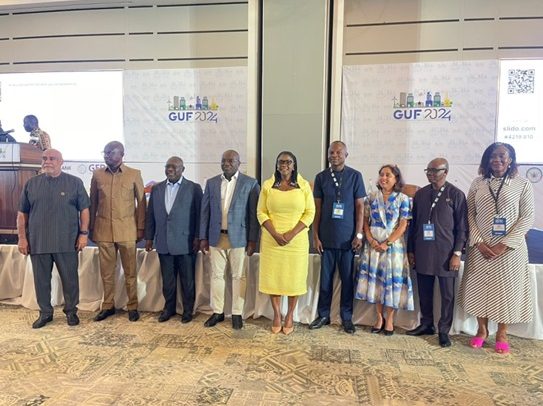State officials and dignitaries after the opening session
Minister for Local Government, Decentralisation and Rural Development (MLGDRD), Martin Adjei Mensah-Korsah, has indicated that the government would be advancing the gains made through the design of the Sustainable Cities and the Kumasi Urban Mobility and Accessibility projects.
The projects, implemented with funding from the World Bank amounting to about $620 million resulted in positive gains including revenue generation, solid waste management, local economic development, improved mobility and accessibility, improved slum conditions, improved infrastructure and service delivery and ultimately, improved living conditions.
He, thus, urged Metropolitan, Municipal and District Assemblies (MMDAs) to take ownership of policies focused on urban development to effect the needed change and transform urban areas.
“As per Section 12 of the Local Governance Act, 2016 (Act 936), I wish to entreat Metropolitan, Municipal and District Assemblies to champion the urban development agenda within their jurisdiction,” he said.
He was speaking at the 2024 Ghana Urban Forum (GUF) held in Accra on the theme, “Nurturing Roots, Growing Futures: Combining Policies and Partnerships for Urban Resilience and Transformation.”
Mr. Mensah-Korsah said urbanisation presents a lot of opportunities that has the potential to change the face of our development and hoped that the earlier actions are driven by downward accountability, digitalisation, citizen participation and inclusion in urban governance.
Mr. Mensah-Korsah said the United Nations Agenda for Sustainable Development Goal (SDG) 11 identified sustainable urbanisation as one of the key priorities for global development.
“The adoption of the New Urban Agenda in 2016 has engendered national and local governments around the world to embark on a transformative path towards making SDG11 a story of the past,” he stated.
He indicated that the government was determined to achieve the regional and global commitments through various policies and programmes.
He said the country however faced increasing traditional and emerging challenges such as pandemics, risk of extremism and climate change, which had a high potential to undo the transformation and investment achieved so far.
“It is our belief that through the development and effective delivery of policies and programmes, and strong partnerships we will contribute to improving the living conditions of Ghanaians,” he added.
United Nations Resident Coordinator, Charles Abani, said there was the need for inclusive economic transformation, equitable access to basic services, and resilient peace in the country and the importance of collaborative partnership for sustainable urban development.
He said there was a need for digital transformation, sustainable finance, and resilient coastal areas and a need for sustainable solutions to address the complex challenges facing Ghana’s development.
A Daily Guide Report


